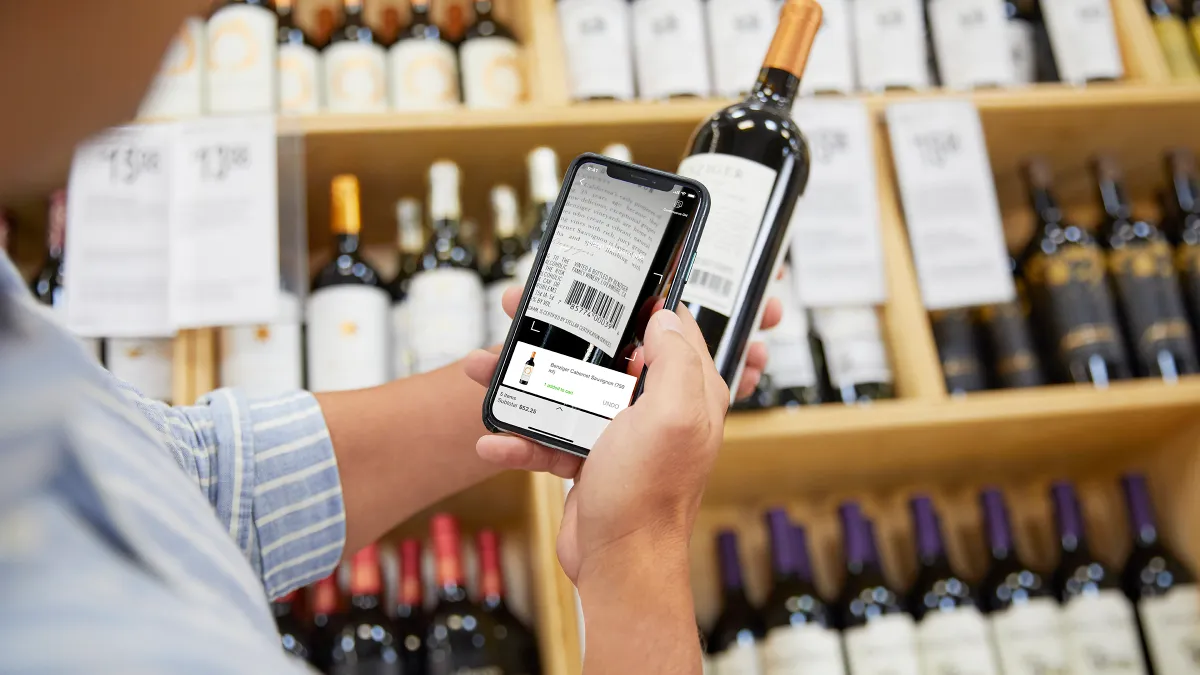Dive Brief:
- Uber Technologies is buying alcohol delivery startup Drizly for about $1.1 billion in stock and cash, the companies said in a statement. Drizly's on-demand alcohol marketplace is available in more than 1,400 cities. Bloomberg noted Drizly was valued at $73 million in 2017.
- Uber said Drizly will eventually be integrated with the Uber Eats app, while also maintaining the separate Drizly app. The transaction is expected to close in the first half of 2021.
- With the coronavirus remaining entrenched throughout the U.S. for much of the last year, e-commerce sales have surged. Alcohol has been among the biggest beneficiaries from the uptick, with restaurants, bars, stadiums and other venues closed or seeing operations sharply curtailed, and consumers spending more time at home.
Dive Insight:
Until the coronavirus pandemic, most consumers had largely ignored going online to purchase alcohol. Now, many people have woken up to the convenience of getting items delivered straight to their door. In a statement announcing the deal, Drizly said it has experienced more than 300% growth in the past year. Drizly CEO Cory Rellas told The Wall Street Journal last April he expected the pandemic to accelerate online sales to as much as 8% of all alcohol bought from retailers, up from around 2% share at the time of the interview.
"By bringing Drizly into the Uber family, we can accelerate that trajectory by exposing Drizly to the Uber audience and expanding its geographic presence into our global footprint in the years ahead,” said Dara Khosrowshahi, Uber's CEO, in a statement announcing the deal.
Unlike Uber, which has a team of drivers to move consumers or deliver food through its Uber Eats app, Drizly doesn't actually deliver alcohol. Rather, it uses its software to connect shoppers to retailers or liquor stores, who then coordinate delivery of the product to consumers.
With the merger, Drizly immediately gets access to thousands of Uber drivers to deliver beer, wine, spirits and other alcohol. It also gives the alcohol delivery service a way to more rapidly expand into new markets by tapping into Uber's presence in U.S. cities and potentially overseas. This convenience and broader reach could attract more retailers looking for another channel to use to connect with consumers, further cementing Drizly's reach in this niche segment. For Uber, tying Drizly to its Uber Eats app could lead people to use both services more frequently — deepening loyalty with existing customers and potentially ceding share from delivery competitors.
Founded in 2012, Drizly reported last April that sales were up nearly 400% over baseline, or what is typical for this time period. Much of this growth comes from an influx of new customers, who accounted for 27% of orders compared to a usual rate of 15%.
The $1.1 billion purchase by Uber amounts to a bet that home delivery for alcohol will continue even after the coronavirus has abated. While more consumers were gravitating online to purchase items even before the pandemic, alcohol had lagged other consumers goods. Now, buying habits have undoubtedly changed permanently — with few categories seeing as much of an acceleration in demand as purchasing alcohol online.
The integration with Drizly could be a powerful differentiator as third-party restaurant delivery companies seek to grow both diner engagement and their partner rosters as the pandemic stretches on. Still, the offering may be more attractive to diners than restaurants already on or considering joining Uber Eats' platform, as many operators began selling their own alcohol for delivery to boost margins during dining room restrictions. If buying beer, wine and liquor through Drizly is cheaper than through an independent restaurant's menu, this could be potentially detrimental for that operator's sales.
Around 7 in 10 full-service restaurants who sell alcoholic beverages said they began offering them with takeout or delivery orders since the start of the pandemic, and so did more than 50% of QSR and fast casual operators who serve alcohol, according to the National Restaurant Association's 2021 State of the Restaurant Industry report. Thirty-five percent of off-premise consumers aged 21 or older — and 53% of millennials — report they would be more likely to choose a restaurant if they can order alcohol with their food, making this a key offering for restaurants to protect their bottom line.
















